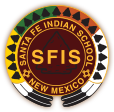Academics
Educator Profiles
View AllMatt Pecos
Community Based Education
HS Academics
Cochiti Pueblo

When going to college at the University of New Mexico and being out there on your own—it’s an experience deciding what you’re going to do, how you’re going to do it. I began to realize how I missed home. What we’re told and what we’re encouraged to do is to think about the communities we come from and to really try and learn as much as we can in Western society education and then take what you learn and bring it back to your community was something that was really strongly encouraged not only by parents, but by the leadership of our communities and the community as a whole. That started me on my training to do something that I could bring home. So I graduated from UNM with an emphasis on Accounting. I was asked by the leadership of the community to work for the Pueblo of Cochiti as an Accountant in their Finance Department. Remembering that this was the whole reason why I went to school was to make a contribution to my community, and here was my chance to do that.
I’ve been at SFIS since 1988 and have been blessed with the opportunity of working with our young people. I teach Cochiti Keres language and am also the Community Liaison for the Community Based Education (CBE) program, which had been a pilot program trying to develop new ways of getting young people motivated in the areas of math and science—courses where across the state and in the country young Native American youth were not doing well. Now 14 years later, I’ve seen CBE grow from a pilot to being part of the regular academic program where each teacher that teaches courses here is required to have at least one unit of community based education or community-based issues that are integrated into their course curriculum.
In CBE, we acknowledge the kind of education that communities have—like traditional leaders who have so much knowledge about life, the community, environment, nature and just about anything you can think of about in the community. Knowledge and skills have been obtained through very long years of not only living in the community, but interacting with members of the community that have this knowledge. A lot of times we assume that knowledge is always going to be there, but these individuals have to learn it, have to be committed to their community and we have people in our communities who are now acknowledged through CBE.
I classify myself as a mentor, as a person that is there for the needs of the children. As a mentor you help them with what they know to grow, rather than thinking of the educational process as students who come with nothing and then you “educate.” My philosophy comes from my community and the teachings that my parents and my leaders have given me on how we as Indian people are to live not only in this society, but on this earth—who we are, who are important parts of our lives. Even as young as they are, students have contributions to make to this educational setting that they are in, and as community members we try to acknowledge that each child comes with a gift and that gift comes in many many ways.
My wish for SFIS students is that they find that balance in this world in order to exist in Western society and also in our own communities, in our own traditional lives in the communities we come from. Western education is good. We need to understand that part of the world because at the present time that is what sustains us, and no one will ever tell you that it’s not good. But that tool is a double-edged sword. When young people go out into the world and they see the world for the first time—you hope that what they learn and attain they are able to have the strength to be able to come back into their own community and utilize that experience. Unfortunately, what sometimes happens is our young people are caught up in that fast world where they begin to find it difficult to find that path back to our communities. My hope for young people is that they find that balance. We’re small—the communities we come from are very very small. And when we don’t have the benefit of contribution of each one, the community is hurting, whether they are fulfilling what they learned in their Western education or fulfilling what they learned in their own traditional communities. Because we need both.
